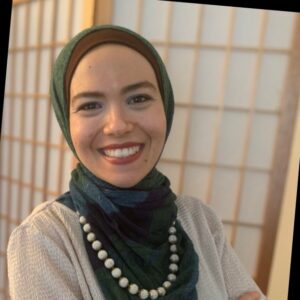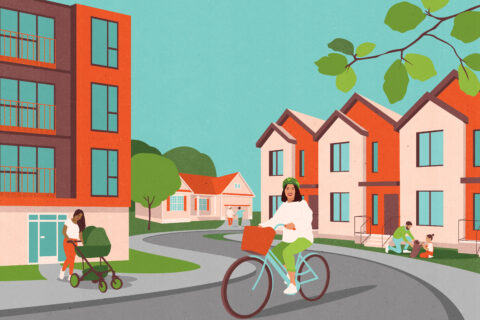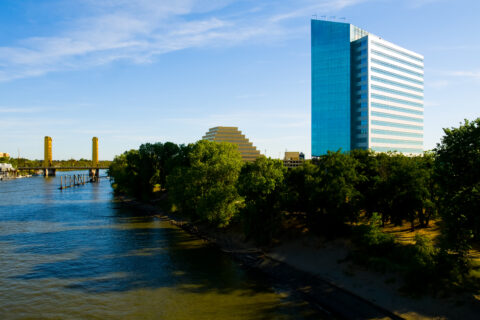Located within Minnesota’s Twin Cities metro area is the City of St. Louis Park, which is home to a thriving economy. When asked what makes their business community unique, City of St. Louis Park’s Community and Economic Development Analyst Julie Grove emphasizes the variety of business types—ranging from the arts to industrial—and neighborhoods full of mixed-use properties across the city. It is also because of these myriad businesses that its municipal government leaders have sought innovative ways to engage all its entrepreneurs (its “entrepreneurial ecosystem”) by learning more about them and their needs through gathering data. Through the City Inclusive Entrepreneurship (CIE) program and its network of program experts, St. Louis Park has partnered with a civic technology company, mySidewalk, that works with communities to manage local data and use it to tell meaningful stories about cities’ community engagement efforts.
Fulfilling a City Goal
One of St. Louis Park’s strategic priorities is “being a leader in racial equity and inclusion in order to create a more just and inclusive community for all.” Thus, the work of the city’s Community Development Department centers on the importance of cultivating relationships with community business leaders, especially those from the BIPOC (Black, Indigenous, and People of Color) community. Grove notes that this strategic priority was supported by their City Council pre-pandemic, but that the conversation about gathering more data about local community entrepreneurs’ needs has since accelerated. She further explains that the department’s business retention activities historically focused on larger businesses but “especially after COVID [the pandemic], we are really wanting to connect with our smaller businesses, which are the backbone of our economy.”
In seeking to gather more information about these businesses and their needs, department members realized local data-gathering needed to be a priority. Many cities in Minnesota do not require business licenses for many types of businesses operating in the state, and St. Louis Park is among them. This policy has led to twin consequences: removing these requirements has eliminated barriers for businesses to operate and come into the city; however, Grove also notes that her team has had to “get creative” because the usual routes to gathering data, like making calls or sending e-mails, glean less complete data.
How St. Louis Park is Doing It
St. Louis Park has been undeterred by these obstacles to gathering data and reaching local business owners who may not have engaged with the city’s economic development supports. In addition to relying on existing relationships Grove’s department has with their county, local entrepreneurial support organizations and regional organizations to gather data about St. Louis Park’s entrepreneurial ecosystem, they have been deliberately engaging small businesses with in-person visits. Grove along with Economic Development Manager Greg Hunt utilize these visits, in part, to ensure they have accurate data about as many businesses as possible. These visits also allow them to offer resources and overcome any existing lack of trust that business owners may feel toward local government. Individual conversations, even when they are short or are not planned, can still foster connection.
Through their involvement with the CIE program and conversations facilitated by mySidewalk, St. Louis Park leaders are also exploring more intentional ways to engage local entrepreneurs via a comprehensive business ecosystem survey, as well as through regular conversations with other cities in their CIE Entrepreneurial Ecosystem Data cohort about how best to create and disseminate business resource information in culturally competent ways.
“By visiting businesses in person, we’re able to hear what a business’s issues with city governments might be, and while we can’t solve all problems, we can show that we hear them, we’re here for them, and when we can, we will help.”
-Julie Grove, Community and Economic Development Analyst, City of St. Louis Park
St. Louis Park hopes this survey and its results will allow them to visualize, fill gaps in, and tell stories about their entrepreneurial ecosystem. While the survey is in its final stages of development, St. Louis Park leaders continue to use in-person visits to increase awareness of existing needs of the business community. They also hope to eventually publicize the survey to all local businesses to get a broader swath of feedback on how they can improve their offerings and programming for small businesses.
As St. Louis Park’s Community Development Department seeks to gain better knowledge about the city’s entrepreneurial ecosystem, Groves shares that success in this process is more than a one-off visit with BIPOC-owned businesses. The survey will help with “learning more about our BIPOC businesses, exploring their experiences, the priorities they have, [and asking] ‘Can we identify more of these businesses and learn what their needs are?’” The department is there to provide and tailor its support to businesses, so determining what and whom they are missing in their work is their starting point.
Lessons Learned
Participation in the CIE program has helped Grove identify ways other cities can further their local entrepreneurial ecosystem data-gathering efforts.
- Wherever possible, try in-person connection. Though time is limited, taking time to walk into a business and introducing yourself can begin a relationship, present an opportunity to share your government’s services and learn what that business’ needs are. When the time comes to more formally survey businesses, as St. Louis Park is doing with mySidewalk’s support, there will be a stronger foundation to gather this information.
- Start with intentional outreach to struggling businesses. Grove and Hunt directed their visits to businesses in areas that were often overlooked or experiencing a challenge; for example, those near new light rail stations undergoing construction.
- Connect with other cities. A hallmark of the CIE program is the cohort model, where municipal leaders engage with one another regularly; however, any city can connect with another offline, and Grove highlights that these kinds of connections can foster collaboration and innovation.
This blog is part of a series highlighting NLC’s City Inclusive Entrepreneurship (CIE) Network. Cities in the network have committed to implementing new policies, programs and practices that increase economic opportunity for residents through small business ownership and entrepreneurship.









